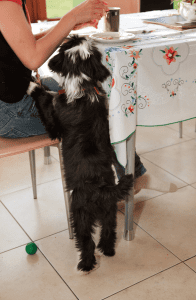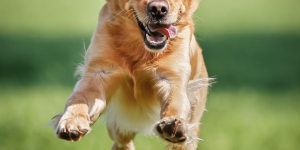Why Are Some Dogs So Demanding?
Dogs are pretty clever creatures and they can also be very good at getting what they want from their owners! Dogs are brilliant opportunists – it’s in their genes. If they see a rabbit fly past, they will grab the chance for a bite to eat. If the bin lid is open?….you get our drift?
This isn’t really bossiness though – these behaviours are completely natural for them. Nevertheless, it can be frustrating for owners if their dog just seems to want to get his own way all the time. If you’ve ever wondered – why are some dogs so demanding? – Read our Holidays4Dogs article to find out why.
Dogs have learned very well how to read human beings, – probably far better than we previously imagined. However, while we may place human attributes onto them, such as rudeness, or naughtiness – most so-called bossy dogs are just displaying natural behaviours. What is really happening, more often than not – is the dog simply doesn’t understand his owner. Alternatively he, or she, might be the type of dog who takes a little extra convincing, to be less demanding.
Why are dogs sometimes considered to be ‘bossy’?
Persistent behaviour such as pawing, whining, barking, staring, clambering all over us, even nipping and growling – are all things an unwitting owner can train their dogs to do, without even knowing it. Often a dog with so-called, bad manners, has learned to be that way – often because of our own faults.
without even knowing it. Often a dog with so-called, bad manners, has learned to be that way – often because of our own faults.
In addition, certain breeds of dog are more likely to more energetic, or quick to learn. Dogs can often learn the things we don’t want them to, just as quickly as the things we do! We often need to teach our canine companions how to behave appropriately both at home, and in other social situations.
Most bad habits our dogs learn, start off in small ways. For example, your dog whines, or yaps to go out, so you let him out. You see your dog asking to go out as good thing, so you encourage it.
Your dog paws at your lap for a titbit, so you give him a treat. Most people wouldn’t think this could become problematic in the future. Usually, it doesn’t – but sometimes it can create habits that become a nuisance.
How problems sometimes escalate.
Dogs can quickly learn to be ‘pushy’ in other ways. They may literally push through doorways, leap out of the car dangerously near a road or, not come back when called. Many of these behaviours happen only because we allow them to, not because the dog is being difficult. The dog does not know any better. He is just being a dog.
Once this stage is reached, owners may be so irritated, they try shouting at the dog to cease the behaviour. If this doesn’t work, they may physically push their dog away, or use aversive techniques such as rattle cans, or water sprays.
By now, everyone is confused and frustrated. Side effects can develop that are then more serious than the original problem behaviour. This might mean the dog snaps, or growls, for example. It can also damage the bond between dog and owner. As a result of all this, it makes other things harder to teach, such as recall training.
So, what can be done, once unwanted habits have set in?
Extinction training.
If you have a demanding dog , one of the ways to deal with it, is to ignore the behaviour you do not want to see. In dog training terms, this is knows as ‘extinction training’. 
In a nutshell, this refers to the idea that a lack of reinforcement causes certain behaviours to stop – i.e. ignoring the behaviour.
However, this only works for something that has been previously reinforced – such as rewarding the dog with attention.
It also works better if used in conjunction with rewarding the dog for the behaviour you want to see – i.e. keeping all feet on the ground, rather than jumping up.
Extinction training doesn’t work for every behaviour and it can sometimes take a long time to work. However, it can work very well in other scenarios. For example, if you have previously rewarded your dog for begging at the table, but you ignore that behaviour and reward your dog for going to his crate instead.
Avoid accidentally reinforcing your dog.
So how do you do it? Basically, you must ignore your dog each time the behaviour occurs that you do not want – but you must reward him for one you do. Let’s take a common problem – that pesky jumping up we talked about and which many pet dogs do.
Now, dogs don’t actually regard this as a problem. It is natural for them to want to get near to the facial area of a person, so jumping up is the only option from his point of view. He is often rewarded for this behaviour by being petted. However, he may also be reinforced for any type of response which could even be – being pushed away.
In this case, ignore your dog each and every time he jumps up at you. Walk, or turn away, giving your dog no response. You will also need to advise any visitors to do the same. When your dog’s feet are firmly on the ground, reward immediately – this is the important part.
Don’t JUST ignore your dog.
There is one issue to be aware of and that is the ‘extinction burst’. Don’t worry, your dog won’t ‘explode’ if you ignore him too much!
This refers to the point where your dog has been ignored, but the behaviour you are trying to extinguish actually gets worse before it gets better.
where your dog has been ignored, but the behaviour you are trying to extinguish actually gets worse before it gets better.
In the case of jumping up, the dog tries harder to reach his goal by jumping higher, or more frequently. Basically, he is thinking; “I’m not getting anywhere with this, so I must try harder!”
However – and this is very important – ideally, you want to avoid this stage as this creates more frustration in the dog and potentially the behaviour gets worse.
The dog may start to yap or nip, for example. Therefore, it is crucial that at the same time, you re-direct your dog to the ‘good’ behaviour and reward immediately that occurs.
You see how dogs do try hard to please in their own world, they just doesn’t know how to in ours – so we need to show them by positively reinforcing behaviours we like – and yes, in certain cases, ignoring the behaviour we don’t like.
Exercise and enrichment.
Not having enough exercise can sometimes cause a dog to seem bossy, or demanding. Engaging in enriching activities is important to keep dogs happy both mentally, and physically. There are lots of activities you can do with your dog from obedience, to canine urban agility.
Conclusion.
Ignoring, re-directing and rewarding your dog for good behaviour is far better than resorting to punishment. Indeed, punishing your dog can end up causing more problems than you started out with.
If your dog is already quite demanding, all is not lost. You can go back to basics and teach your dog through positive reinforcement.
all is not lost. You can go back to basics and teach your dog through positive reinforcement.
A good training class, or an an on-line course with Holidays4Dogs will help you to understand how this works. Positive training teaches your dog to understand that he gets what he wants only by being calm and patient.
A positive and calm approach will help even the most challenging behaviours. If you need extra support, enlist the help of a trainer, or behaviourist to guide you. With some consistency and patience you can have a dog that is a pleasure to be with.


